Essential Vocabulary of Travel for Different Situations
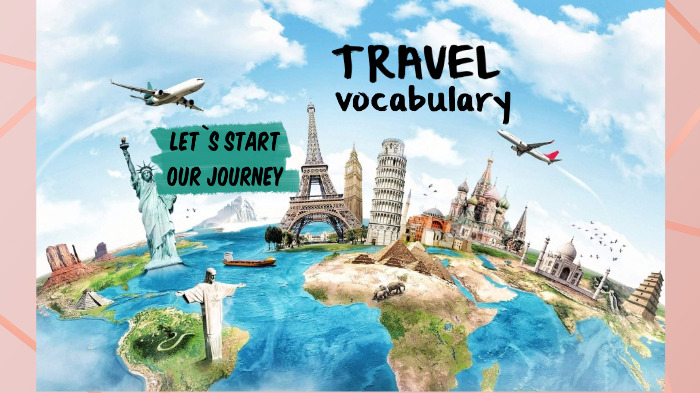
When traveling, it’s important to know the right words for various situations, from booking accommodations to navigating through airports. Here is a list of essential vocabulary of travel you’ll encounter frequently.
1. Accommodation
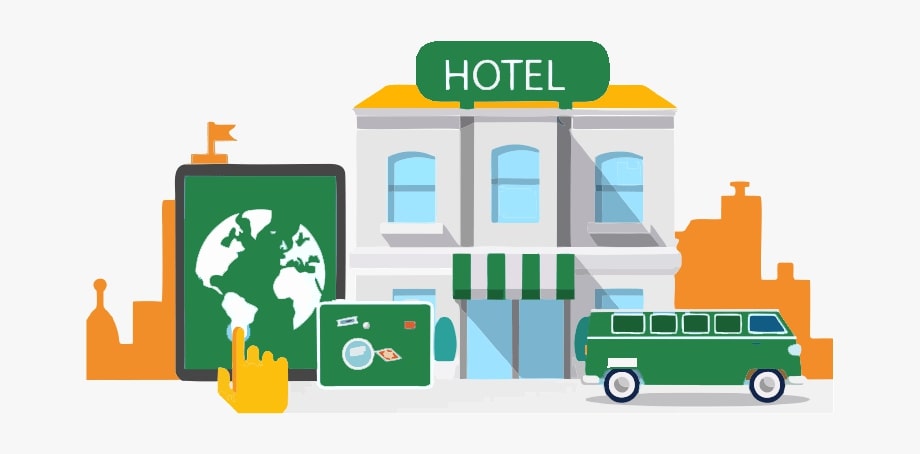
When booking a place to stay, knowing how to describe the type of accommodation you’re looking for can be invaluable. Especially, if you are in a bleisure travel, you need to have key travel vocabulary and term related to accommodations prepared for a very tight schedule. Here are some travelling words for such trips:
- Airbnb – A home rental service for travelers.
- Hotel – A place that offers lodging for travelers.
- Hostel – A budget-friendly option where travelers share rooms.
- Motel – A budget-friendly roadside accommodation.
- Guesthouse – A smaller, often family-run accommodation.
- B&B (Bed and Breakfast) – A place that provides both a bed and a meal in the morning.
- All-Inclusive – A package including meals, drinks, and sometimes activities.
- Continental Breakfast – A light breakfast usually including pastries, coffee, and juice.
- Check-in – The process of registering and receiving a room at a hotel.
- Check-out – The process of leaving and paying for the accommodation.
- Check-in Time – The time guests are allowed to enter their room.
- Check-out Time – The deadline for leaving the hotel room.
- Room Service – Food or drinks delivered to the guest’s room.
- Housekeeping – The hotel staff responsible for cleaning rooms.
- Do Not Disturb Sign – A sign placed on the door to prevent interruptions.
- Mini-Bar – A small refrigerator stocked with drinks and snacks.
- Hotel Concierge – A hotel employee who assists with booking restaurants, tickets, and taxis.
- Wake-Up Call – A scheduled phone call from hotel staff to wake up a guest.
- Deposit – Advance payment for a booking.
With this list of travel vocabulary, you can easily describe your ideal place to stay and find a suitable option during your travels.
2. Transportation

No trip is complete without using different modes of transportation. Whether you’re traveling by air, land, or sea, it’s important to understand how to communicate effectively. Some useful travel vocabulary words include:
- Public Transport – Buses, trains, and metro systems available for general use.
- Subway/Metro – An underground urban train system.
- High-Speed Train – A fast train (e.g., the Eurostar or Japan’s Shinkansen).
- Bus Terminal – A central station where buses depart and arrive.
- Itinerary – A planned schedule of travel details.
- Transit – Temporary stop or connection between journeys.
- Layover – A stop between flights, usually for a few hours.
- Stopover – A longer layover, typically 24+ hours on an international trip.
- Round Trip – A ticket covering both departure and return.
- One-Way – A ticket for travel to a destination without return.
- Car Rental – Hiring a car for temporary use.
- Bicycle Rental – A service for borrowing bikes for travel.
- Rideshare – Services like Uber and Lyft where you share a ride.
- UBER/Lyft – Popular ride-sharing services.
- Shuttle – A transport service running regularly between two points.
- Toll Booth – A place where drivers pay a fee to use a road.
- Fare – The price paid for a ticket.
- Boarding Pass – A document allowing entry to a flight or train.
- Peak Hours – The busiest travel times, also called rush hour.
- Off-Peak – Travel times when fares are lower due to less demand.
- Valid Ticket – A ticket that is still usable and not expired.
- Check-in – The process of registering for a flight.
- Baggage Claim – The area where passengers collect their luggage.
- Customs – Border control checks when entering a new country.
- ETA (Estimated Time of Arrival) – The expected arrival time.
- ETD (Estimated Time of Departure) – The expected departure time.
- HOV (High-Occupancy Vehicle) – A carpool lane for vehicles with multiple passengers.
- GPS (Global Positioning System) – Navigation tool for directions
By understanding the vocabulary of travel related to transportation, you can choose the best way to get around while traveling or incorporate with vocabulary of business or interviews job for a smooth bleisure travel.
3. Food and Dining Vocabulary
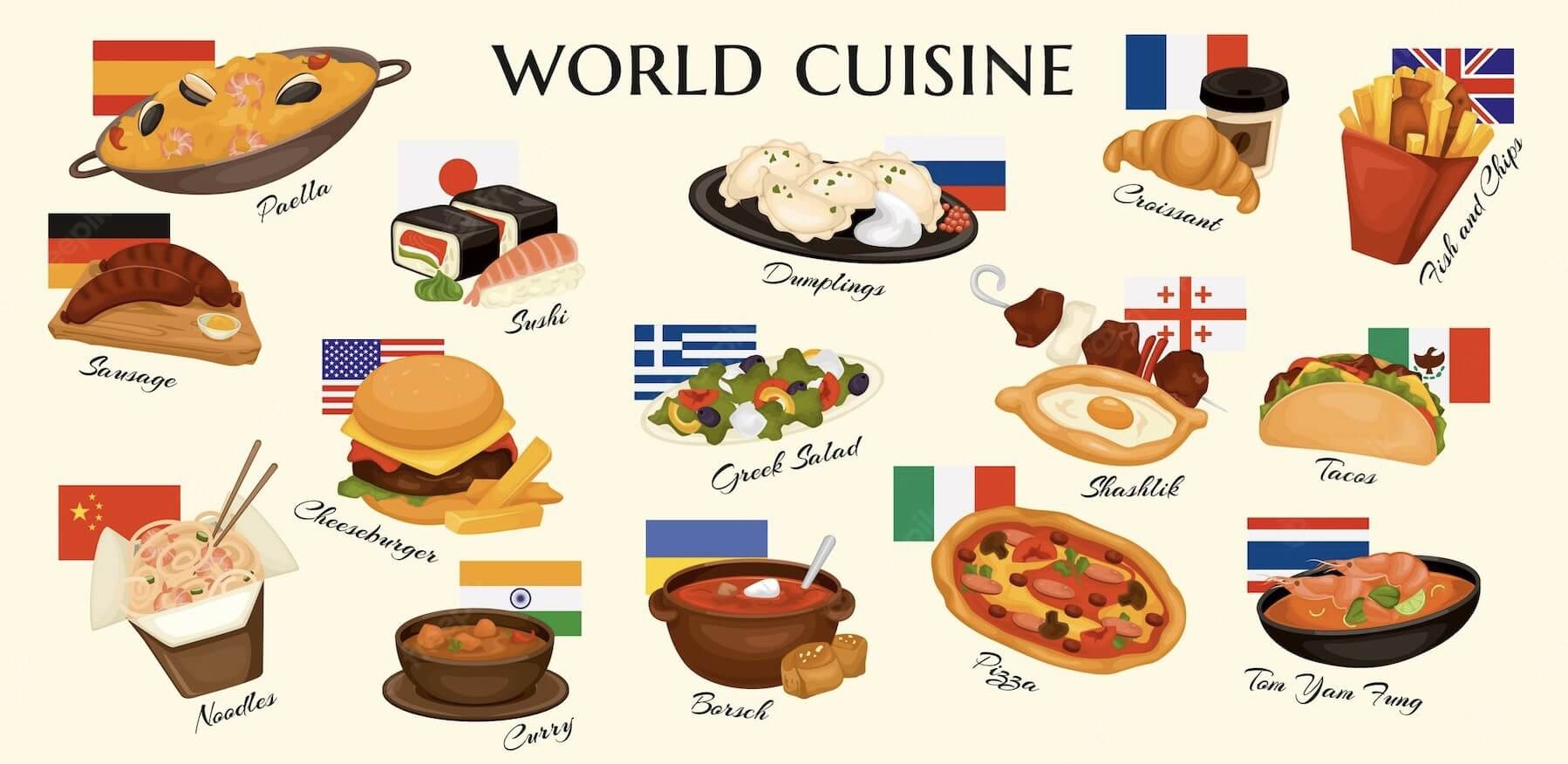
Food is often one of the highlights of any trip. Being able to read a menu or order food can greatly enhance your experience in a new country. Key vocabulary of travel about food includes:
- Menu – A list of food and drink options available at a restaurant.
- Cuisine – A style of cooking (e.g., Italian cuisine, Thai cuisine).
- Appetizer – A small dish served before the main course.
- Entrée – The main course of a meal (in American English) or an appetizer (in French).
- Side Dish – A smaller portion of food served with the main course.
- Main course – The primary dish of a meal.
- Dessert – A sweet dish typically eaten at the end of a meal.
- Beverage – Any drink, including water, soda, juice, or alcohol.
- Buffet – A self-serve dining option with a variety of food choices.
- À la carte – Ordering individual dishes from the menu instead of a set meal.
- Waiter/Waitress: The person who serves food in a restaurant.
- Vegetarian – A person who does not eat meat.
- Vegan – A person who does not eat any animal products, including dairy and eggs.
- Gluten-Free – Food that does not contain wheat or gluten.
- Food Allergy – A reaction to certain foods (e.g., peanut allergy, dairy allergy).
- Spicy – Food with a hot or burning flavor (e.g., chili peppers).
- Reservation – Booking a table at a restaurant in advance.
- Fine Dining – An upscale restaurant experience.
- Fast Food – Quick-service meals like burgers and pizza.
- Street Food – Local dishes sold by vendors on the street.
- Bill/Check – The total amount of money owed after dining.
- Tip/Gratuity – Extra money given to the server for good service.
- Cashier – The person who handles payments at a restaurant.
- Takeout/To-Go – Ordering food to eat outside the restaurant.
- Delivery – Ordering food to be brought to your location.
- All-You-Can-Eat – A dining option where you can eat unlimited food for a fixed price.
- Cover Charge – A fee for entering some restaurants or events, separate from food cost.
With a solid understanding of food-related travel vocabulary, you’ll be able to navigate restaurants with ease and try new local dishes.
4. Sightseeing and Activities Vocabulary

Whether you’re visiting a historical site or hiking in nature, there are certain travel vocabulary words will help you understand and enjoy the experience better. Consider these words:
- Attraction – A place of interest for tourists (e.g., Eiffel Tower, Grand Canyon).
- Landmark – A recognizable feature of a place, often of historical significance.
- Museum – A building where artifacts and art are displayed.
- Excursion – A short trip or outing.
- Hiking – Walking in nature, often through challenging terrain.
- Monument – A structure built to honor a person or event.
- Heritage Site – A protected cultural or natural site (e.g., UNESCO World Heritage Site).
- Scenic View – A beautiful natural landscape (e.g., mountain viewpoints, coastal cliffs).
- Audio Tour – A self-guided tour using recorded information.
- Guided Tour – A tour led by an expert who provides information about the location.
- Self-Guided Tour – Exploring a site on your own without a tour guide.
- Walking Tour – A guided tour on foot to explore a city or area.
- City Tour – A general tour covering the main attractions in a city.
- Cultural Tour – A tour focused on local traditions, history, and lifestyle.
- Food Tour – A guided experience tasting traditional local dishes.
- Souvenir – A small item bought as a memory of a trip.
- Festival – A public celebration with music, food, and performances.
- Concert – A live music performance.
- Theater/Show – A live performance, such as a play or musical.
- Sightseeing Cruise – A boat trip to view famous landmarks.
- Local Market – A place where handmade goods, food, or souvenirs are sold.
- Road trip – A long trip or holiday taken by car.
Being familiar with sightseeing and travel vocabulary will help you plan and enjoy the many experiences your trip has to offer.
5. Comprehensive Vocabulary of Travel
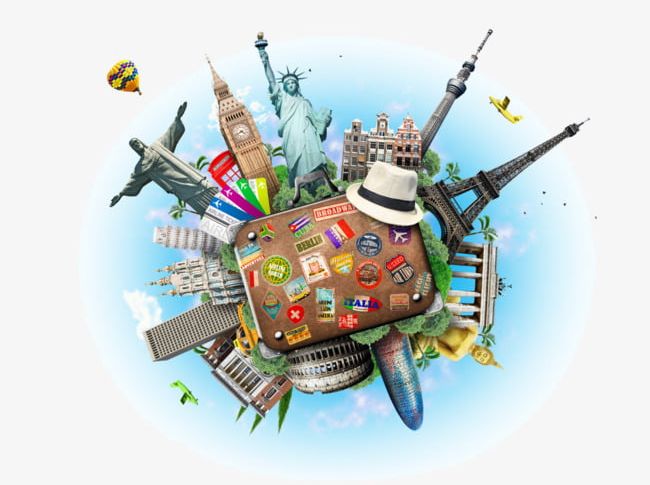
To help you further expand your travel knowledge, here is a comprehensive list of vocabulary of travel that includes the most important terms to remember:
- Passport – A document that proves your identity and citizenship, necessary for international travel.
- Passport Validity – The expiration date of your passport (some countries require 6 months of validity).
- Visa – A document granting permission to enter a country.
- Visa-Free Entry – Traveling to a country without needing a visa.
- E-Visa – A digital travel authorization obtained online.
- Luggage: The bags and suitcases that you take with you while traveling.
- Carry-On Bag – A small bag that passengers can take inside the plane.
- Checked Luggage – Suitcases transported in the cargo hold of the plane.
- Checked Baggage Allowance – The weight and size limit for suitcases in the cargo hold.
- Baggage Claim – The area where luggage is retrieved after a flight.
- Baggage Claim Tag – A label used to track checked luggage.
- Ticket – A document that allows you to board a form of transportation or enter a venue.
- Customs – The process of checking goods and luggage at the border.
- Itinerary – A detailed plan or route of your trip.
- Departure – The act of leaving a place, typically in the context of a flight.
- Arrival – The act of reaching your destination.
- Landing – The moment an aircraft touches down at its destination.
- Non-Stop Flight – A flight that goes directly to its destination without stopping.
- Connecting Flight – A flight that requires a stop at another airport before reaching the final destination.
- Boarding Time – The time passengers must enter the aircraft.
- Turbulence – Air movement causing a bumpy flight.
- Aisle Seat – A seat next to the walkway on a plane.
- Window Seat – A seat next to the window of a plane.
- Cabin Crew – The flight attendants on board.
- Jet Lag – Fatigue from traveling across time zones.
- Currency Exchange – Changing money from one currency to another.
- Exchange Rate – The value of one currency compared to another.
- Travel Insurance – Protection against trip cancellations, medical emergencies, or lost luggage.
- Travel Advisory – Government warnings about potential dangers in a destination.
- Customs – The checkpoint for declaring goods when entering a new country.
- Duty-Free – Shops in airports selling tax-free products.
- Tax-Free Shopping – Buying goods without paying certain taxes.
- Tax Refund – A refund on goods purchased in certain countries.
- Fixed Price – A non-negotiable price.
- Credit Card – A payment card allowing purchases on credit.
- Debit Card – A payment card linked to a bank account.
- Emergency Contact – A person to call in case of an emergency.
- Emergency Exit – The designated escape route in case of an emergency.
- Embassy/Consulate – An office representing a traveler’s home country.
- Local Authorities – Government officials responsible for law and order.
- Medical Assistance – Help from a doctor or hospital.
- Lost & Found – A place for retrieving lost items.
- Pickpocketing – The act of stealing from someone’s pocket.
This list covers essential travel-related vocabulary, categorized to help you communicate effectively while traveling, even in emergency cases.
6. Key Phrases for Communication
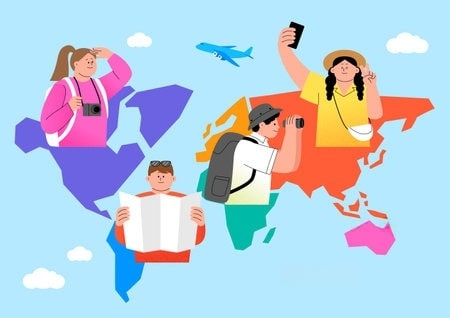
To ensure you are fully prepared for your journey, it’s helpful to learn a few key English travel vocabulary, such as:
- How do I get to [location]? – A phrase used to ask for directions.
- What time is my flight? – A question to confirm your flight time.
- Can you help me? – A polite way to ask for assistance.
- I have a reservation under the name [Your Name] – Informing hotel staff that you have booked a room.
- What time is check-in/check-out? – Asking when you can enter or leave your hotel room.
- Is breakfast included? – Asking if breakfast is part of the hotel price.
- Can I get a late check-out? – Requesting to stay longer past the usual check-out time.
- How much is a ticket to [destination]?” → Asking about the fare for a ride.
- How much is the entrance fee?” → Asking about the cost to visit an attraction.
- How much does this cost? – A common phrase used when shopping or negotiating prices.
- Do you have a map? – Asking for a guide to help you navigate the area.
- What do you recommend? – Asking for the best dishes at the restaurant.
- I have a food allergy to [ingredient] – Informing staff about a serious food allergy.
- Can you speak more slowly? – Requesting clearer speech.
- Do you speak English? – Asking if someone speaks English.
See also:
Conclusion
In summary, knowing the right vocabulary of travel can make all the difference in how you experience your trip. By learning these essential words, you’ll travel with confidence and ease. Ready to improve your travel English? Learn English and explore more travel vocabulary topics from GuruLango today! With categorized topics, GuruLango makes learning easier, providing essential vocabulary of for any destination.